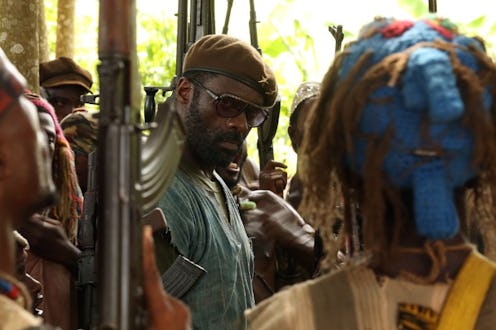Entertainment
How Idris Elba Created The Terrifying Commandant

When he was first approached about Beasts of No Nation, Idris Elba was a bit reluctant. Not because he had any doubts about the project; he was nervous about playing the terrifying Commandant, the leader of a brigade of rebel soldiers that recruits young boys to fight against brutal government forces. "People want the character they love," Elba, known for beloved roles on The Wire and Luther, told Rolling Stone . "I had a little bit of hesitation around taking this role because of that." But Elba's brilliant charisma, for which director Cary Fukunaga wanted him in the role, makes the Commandant simultaneously nauseating and sympathetic. On one hand, he's a cold-blooded soldier, unfazed by the violence of war and the lengths he had to go to ensure loyalty from his company. But on the other, he's a tender surrogate parent who coaxes the best performance possible from his boys by promising them glory and success. The scenario plays out in a nameless West African country, but is Idris Elba's Beasts of No Nation character based on a real person?
Like Beasts of No Nation as a whole, the Commandant can't be attributed to a single individual. He represents a broader truth about many military leaders involved in West African conflicts as charted in the book of the same name by Uzodinma Iweala. Some literary critics suspect the novel to be based on Iweala's home country of Nigeria; the film was shot in Ghana, though filmmakers also investigated Sierra Leone and Liberia as potential locations. As Elba has told it to multiple outlets, he based his performance on just as many iconic, ruthless leaders as the film took cues from potential settings.
One of the Commandant's right-hand men strolls around the production nearly entirely naked. Beasts of No Nation took advantage of a large amount of untrained talent — actors quite literally plucked off the streets and placed in their roles — and the actor playing this character was one of them. His name, Elba told Rolling Stone, is "Anointed." He was once a child soldier in Liberia, and like Agu of Beasts of No Nation, he killed someone at a shockingly young age. Anointed became a "real-life Commandant," Elba said. "I was sh*t-scared of him. ... That was a real eye-opener for me." While Elba's Commandant wasn't necessarily based on Anointed, playing alongside a man with the lived experience Elba was meant to portray undoubtedly influenced his performance.
Reviewers of Beasts of No Nation have been quick to draw parallels to another great-yet-harrowing war movie, Francis Ford Coppola's Apocalypse Now. In this comparison, Elba's character looks a lot like Kurtz, the mad, charismatic colonel that Martin Sheen's character is tasked with tracking down. For Elba, though, this parallel is one about a wider human preoccupation with conflict and war, rather than a direct influence on the film. "We are quite fascinated as a race about the atrocities of war," Elba told IndieWire.
Yet Elba refused any one influence for his performance, instead electing to research what made powerful men in history so powerful. "I didn't want to specifically research these kind of men or base him on anyone at all, because that would have felt like mimicking," he told Rolling Stone. "It turns out that charisma and being a sociopath are interestingly linked," he added, citing Hitler as one such example.
It's far too easy to cast the dark and violent military commander as flatly evil. Beasts of No Nation draws on the strength of each of its characters, the Commandant included. As Elba told Rolling Stone, "Anyone can play mustache-twiddling evil, you know? It's tougher to play someone like this as a human being. Because then you can't just dismiss that person. You have to confront him." Beasts of No Nation doesn't sugar-coat the atrocities it contains, but neither does it relegate them to realm of otherness. And part of this is the strength of its lead actors — Elba takes inspiration from multiple sources in order to create a more rounded antagonist, refusing to take the easy way out in an already tough-to-digest story.
Images: Netflix (3)